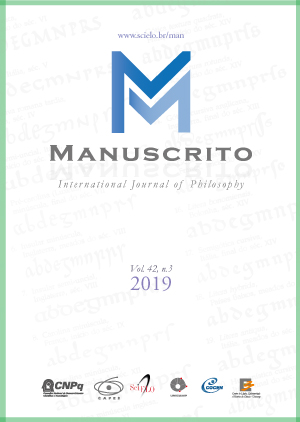Resumen
Do incompatibilist arguments, like some fatalist arguments, rest on modal fallacies? If Westphal (2012) is right, then one popular argument for incompatibilism van Inwagen’s “First Formal Argument” - does rest on a modal fallacy. Similarly, Warfield (2000) claims that the standard modal formulation of the master argument for incompatibilismisamodalfallacy. Here, Irefutebothclaims. Contra Westphal, I show that the mistake in van Inwagen’s "First Formal Argument" is no modal fallacy. After that, I argue that Warfield’s charge of modal fallacy can be easily avoided by using a plausible principle concerning actuality. Then, I show that this allows one to put forward a fairly simple argument for fatalism (the thesis that we aren’t able to do otherwise from what we actually do).
Citas
Cresswell, M., 1990. Entities and indices. Dordrecht: Kluwer Academic Publishers.
Crossley, J. N. and Humberstone, L, 1977. The logic of ‘actually’. Reports on Mathematical Logic 8: 11-29.
Cutter, B., 2017. What is the consequence argument an argument for?. Analysis 77 (2): 278:287.
Fine,K., 1994. Essenceand modality: the second philosophical perspectives lecture. Philosophical Perspectives, 8: 1-16.
Ginet, C., 1983. In defense of incompatibilism. Philosophical Studies, 44: 391-400.
Ginet, C., 1990. On action. Cambridge: Cambridge University Press.
Haji, T., 2009. Incompatibilism's allure. Buffalo: Broadview Press.
Hazen, A. P., 1976. Expressive completeness in modal language. Journal of Philosophical Logic, 5:25-46.
Lamb, J., 1977. On a proof of incompatibilism. The Philosophical Review, 86: 20-35.
Levy, N. and McKenna, M., 2009. Recent workon free will and moral responsibility. Philosophy Compass 4 (1): 96-133.
Lewis, D. 1981. Are we free to break the laws?. Theoria 47: 113-21
Raven, M., 2015. Ground. Philosophy Compass 10 (5): 322-33.
Rice, H., 2014. Fatalism. Retrieved from: https://plato.stanford.edu/entries/fatalism/.
Van Inwagen, P., 1975. The incompatibility of free will and determinism. Philosophical Studies, 27: 185-199.
Van Inwagen, P., 1983. An essay on free will. Oxford: Clarendon Press.
Vihvelin, K., 2003. Arguments for incompatibilism. Retrieved from: https://plato.stanford.edu/entries/incompatibilismarguments/.
Warfield, T., 2000. Causal determinism and human freedom are incompatible: a new argument for incompatibilism. Philosophical Perspectives 14: 167-80.
Warfield, T., 2003. Compatibilism and incompatibilism: some arguments. In: The Oxford Handbook of Metaphysics. Michael Louxand Dean Zimmerman (eds.), Oxford: Oxford University Press, 613-630.
Westphal, J., 2012. Is there a modal fallacy in van inwagen's first formal argument’?. Analysis 72 (1): 36-41.
Wiggins, D., 1973. Towards a reasonable libertarianism. In: T. Honderich (ed.) Essays on Freedom of action. Boston: Routledge and Kegan Paul, pp. 43–44.


